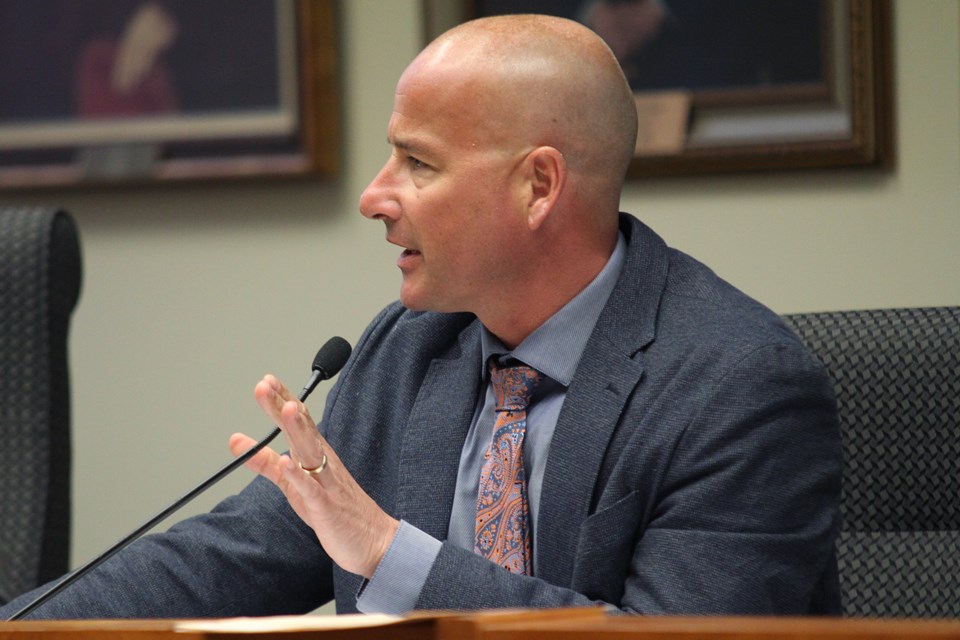THUNDER BAY – Municipal politicians are less than thrilled with changes the province made to the city’s official plan.
The long-term land use guiding document, which was adopted by the previous term of Thunder Bay city council last April, was approved by the provincial government earlier this month, though it reversed three decisions made by municipal representatives.
The modifications include reversing the designation for the northern portion of the provincially-owned Lakehead Psychiatric Hospital property to residential, instead of the community tag applied by the previous term of council that was meant to restrict development.
Coun. Andrew Foulds, who represents the Current River ward where the Lakehead Psychiatric Hospital grounds are located, referenced the report prepared by administration and believes the province was only focused on dollar signs.
“It appears to me that the sole decision-making platform of the province was money,” Foulds said during Monday evening's Thunder Bay city council meeting.
“They’ll make more money by selling the lands as residential. It has nothing to do with planning. I thought it was a bit simple when they talked about, ‘well, we can protect trails.’ The argument to protect those lands was much more than protecting dog trails.”
Foulds mentioned stormwater management and protection of area waterways as specific factors that the province did not mention in its commentary.
The report provided by administration included some of the government’s rationale. The provincial changes are not appealable.
“The Province believes that the Community designation provides less certainty as it relates to future development potential, which could result in the site remaining unused for a much longer period of time,” the report reads. "The Province notes that the subject land is surrounded by fully serviced urban residential neighbourhoods supported by public transit, a park and walking trails, which makes this area an appropriate and desirable location for future urban growth and development."
City administration received a draft of the province’s decision on Jan. 24. The city was given a three-week window to respond, with its request to extend the deadline past March 11 denied.
Mayor Bill Mauro, who was formerly the minister of municipal affairs, questioned why council wasn’t notified prior to the final March decision.
Mauro said while he didn’t doubt that administration made their case, he made it clear he believed there could have been different avenues to lobby, whether or not it would have made a difference.
“There were six or seven weeks within that time period that this council could have been made aware of the province’s changes and been provided an opportunity to do their work politically – not administratively – that may or may not have had some consequence in terms of meeting what the community had put forward as their recommendation for the plans,” Mauro said.
“I just think that perhaps this is something that could have been handled differently.”
Leslie McEachern, the city’s director of planning, said city officials submitted a response to the province after the draft modifications were received.
“We did make it very clear to the ministry that some of the modifications that were being proposed were a direct contradiction to the position that our council had taken,” McEachern said. “I certainly made a point of pointing that out to the province. We were in a very, very tight timeline in terms of providing our comment back to the province and preparing a report for city council’s consideration.”
Council approved a request by administration to allow applications to amend the official plan within the next two years. Without that decision, provincial legislation would have barred any changes.
While council can amend the official plan, city general manager of development and emergency services Mark Smith noted that those changes can be appealed, when asked about the possibility of placing restrictions that would limit site development to green space.
“If it’s council’s objective to essentially do an end run around what would otherwise be permitted by amending the zoning bylaw and requiring more open space than would typically be the case, that would be subject to appeal,” Smith said.
“I think that council shouldn’t take comfort that it can apply rules in that way because those could be appealed.”
Other provincially imposed changes include removing a parcel of land west of 20th Side Road and north of Highway 61 from the rural settlement area boundary and undoing a specific policy allowing unlimited lots from certain lands on Loch Lomond Road. Those changes had been approved by the former term of council, overruling administration recommendations.
Council directed city solicitor Patty Robinet to prepare a confidential memorandum of possible legal options.
